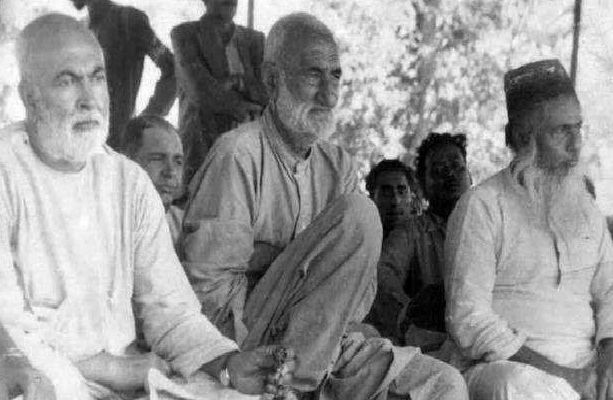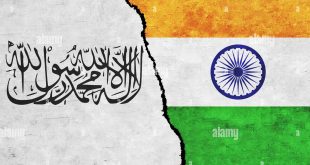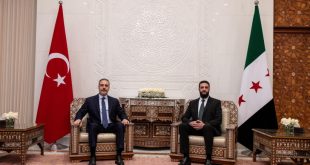This is a special write up on the 42nd Death Anniversary of Abdul Samad Khan Achakzai, an epitome of Pashtuns’ rights and resistance against the British in India, and Pakistan. He was assassinated at the age of 66 by forces of intolerance in Pakistan.
By Abdul Hayee Aryan:
On December 2, 1973, midnight 4:00 am, a 66-year old man was sleeping in his room at Sayyid Jamal-ud-Din Afghan Road Quetta. On that ill-fated night, someone in the street was calling, “is Samad Khan there? Samad Khan woke up and said, “Yes I am here.” The next moment two hand grenades were hurled into his room through the ventilator opened to main road. The grenade attack caused him serious injuries. He succumbed to his injuries in hospital. Physically, Abdul Samad Khan Achakzai died but his political philosophy survived and eventually turned into a national movement. It was not the bomb that kept him alive but his prolonged commitment to his cause. Cause…? Which cause?
Much has been published about the struggle of Nelson Mandela and his 27 years rigorous life in prison. Unlike him, Pashtuns’ Nelson Mandela didn’t remain in the limelight for his greatest cause. Therefore, very little has been published about the legendry leader Abdul Samad Khan Achakzai aka Khan Shaheed who spent more than 30 years in prisons as a political prisoner both during British Raj of India and after the partition of India in 1947. He was jailed for a longer period in Pakistan where he was awarded life sentence with rigorous punishment in the epoch of General (R) M. Ayub Khan.
Abdul Samad Khan Achakzai was born on 7th July 1907 in a mighty Khan family in Qilla Abdullah Khan, a district of the then Pishin, emerged as a sign of relief both for his Pashtuns in the then British Baluchistan and Baluchs of the ‘Kalat State’. He is credited as the pioneer of politics in the then Kalat states of Baluch areas and the present political awareness in Baluchistan is the outcome of Khan’s endeavors for awakening the area’s people 70 years ago. In 1929, his formal political career began when he went to Lahore to attend the annual sessions of Congress, Beharat Loksaba and other political parties. Where he participated in these meetings, met many Indian leaders, shared his views and listened to their point of views. He enlightened himself with new and innovative nationalistic ideas for the emancipation of the oppressed Pashtuns of India that finally led him to awake his nation. On his return to home, he started preaching awareness about the slavery of his people but was arrested by the British government in 1930 and sent him to ‘Much jail’ for two years. Here starts his journey as a political prisoner.
After the release, he went to Delhi on the eve of the first round table conference where he met Mahatma Gandhi and remained Gandhi’s special guest for fifteen days. Khan Shaheed was in Hind, when the great Afghan leader Bacha Khan also came to the conference. The two leaders met for the first time and lived there together for some days.
Khan Shaheed was a very keen and astute leader. He struggled for the rights of Baluch, Pashtun, Sindhi and other nations in the country. His endeavors bore fruits and first united Pashtun-Baloch political party was established. The party was named ‘Anjuman-i-Watan’. He was unanimously elected the president of the party. Anjuman-i-Watan’ struggled for the national integrity, development, provincial autonomy, knocking down of the so-called tribal heads Jirga system, and chronic Sardari system, Frontier Crimes Regulation (FCR). On the call of Anjuman-i-Watan, Bacha Khan visited the British Baluchistan and held public meetings in different districts. Anjuman-i- Watan remained independent and nominally affiliated itself with Indian National Congress in 1942 on the condition that the Congress will also struggle and voice for the Pashtuns’ rights.
On July 3, 1947, Lord Mount batten’s transfer-of power-plan was announced and Hindustan was divided into Pakistan and India. Pashtuns’ political struggle and opinion was totally overlooked and the British Raj announced that the future of NWFP (now Khyber Pakhtunkhawa) would be decided by the so-called referendum while the future of British Baluchistan (Southern Pakhtunkhaw) would be decided by the Quetta Municipal Committee and Shahi Jirga, a loyal assembly consisted of British government privileged Sardars, Nawab and Khans to join India or Pakistan. The Pashtuns of the region—stretching from Chitral to Bolan, were scapegoated as there was no third option of “a separate state “for the Pashtuns. This biased attitude of the Indian National Congress and Lord Mount Battan irritated Pashtuns of the region and millions of Pashtuns were ready to take up arms for their freedom.
After the partition, the new British imperial experiment—Pakistan, and the announcement of freedom Act of 1947, all the tribal areas got liberation in a sui generis way and the ‘Act’ also caused the nullification of the treaty of Durand as under international law treaties are not transferable to a successor state. Moreover, Pakistan in no way fits in the definition of a successor state as it was newly carved out. With the creation of Pakistan, for Pashtuns, it was just a change of masters. Earlier, the Brits were the masters and after coming of Pakistan into existence, the power went into the hands of Pashtuns’ perpetual rivals. They mounted atrocities on Pashtuns to the extent that they left Brits miles behind.
Abdul Samad Khan Achakzai and Bacha Khan witnessed a new wave of oppression. This time it was from their Muslim brethren in the new Islamic state. Khan Shaheed and Bacha Khan were immediately arrested and thousands of Pashtuns were bulleted in Babara and workers of the non-violence national movement were sent behind the bars. The oppression didn’t stop here. They abolished the constituent assembly in 1954 and put an end to the provincial status of British Baluchistan, Sindh, NWFP (Khyber Pashtoonkhawa) and Baluchistan state Union and at last the disreputable One Unit was formed, controlled by Lahore. When they were forming ‘One Unit’, Khan Shaheed was in prison. Yet, he continued his struggle from the jail for the unification of a united and autonomous province from Chatral to Bolan under the name of “Pashtunistan”.
In 1956 Khan Shaheed and the leaders of all other oppressed nations of the East and West Pakistan formed a new party with the name of “National Party”.
National Party was formed after the merger of following parties.
Waror Pashtun of Khan Abdul Samad Khan Shaheed.
Khuda-i-Khidmatgar of Bacha Khan
Sindh Hari Party of Haider Bakhsh Jatoi
Sindh Awami party of J.M Sayyid
Azad Pakistan Party of Mian Iftikhar-u-Din of Punjab
Later, Awami League of Maulana Bashani was merged into National Party and the party was renamed as National Awami Party. However after some years the NAP was divided into two groups on some political differences. NAP (Wali Khan Group) and NAP (Maulana Bashani group).
In 1970, General (R) Yehyah Khan announced the abolition of One-Unite and restoration of the provinces to its prior status. Moreover, in April 1970 new provinces were formed but unfortunately, all the Pashtun areas in Pakistan were imperialistically kept divided into four parts while the British Baluchistan (not the present Baluchistan) was merged into Kalat states and formed the present province of Baluchistan.
The flaccid and distant behavior of the Indian National Congress, Pakistani political parties and NAP, Khan Shaheed reached at the conclusion that Pashtun nation should have a separate political movement “|Khpal Qam Khpala Party” to redress the national question of Pashtun. In July 1970, some Pashtun leaders called a grand Jirga in Hana area of Quetta where they formed a new political party by the name of National Awami Party Pakhtunkhawa. The word ‘Pakhtunkhawa’ was for the first time in Pakistani introduced by Khan Shaheed. Abdul Samad Khan Achakzai was elected as the chairman of the new party, unanimously.
Khan Abdul Samad Khan Shaheed devoted his entire life to the Pashtun national movement. He was the pioneer of modern Pashtun nationalism by introducing
The concept of ‘Khpal Qam Khpala Party’.
Khan was a versatile and untiring grit leader. He was an active politician, a journalist and a writer. During his 66 years of life, he spent 33 years of his precious life in different prisons, formed political parties eg. Anjuman-i- Watan, Waror Pashtun and National Awami Party Pakhtunkhaw to defend the suppressed Afghan Pashtuns, and voice their rights. He also launched many newspapers and magazines including “Istiqlaal” and the monthly ‘Pashto’. Khan Shaheed also translated many books into Pashto including Tarjaman-ul–Quran by Indian Muslim leader Maulana Abdul Kalam Azad, ‘Gulistan-i-Saadi by Sheikh Saadi, and ‘Future of Freedom’ by Dotson Carto. He also wrote his autobiography titled “Zama Zhwand Ao Zhawandun”. He created new and easy Pashto-alphabet titled “Pashto leek dod” and compiled a dictionary of Pashto. Khan Shaheed was a multilingual. He learned seven languages during his stay in various prisons.
Besides his political struggle, much research is needed to be done on his contributions.
The thoughts, deviation, sacrifices of the great leader Khan Shaheed are still bearing fruits and millions of his followers are united under the leadership of Mehmud Khan Achakzai. Pashtuns are still oppressed. Achakzai’s visionary politics and commitment looks to be the only hope to put a full stop of Pashutns’s miseries unleashed by Pakistan—the legacy of British-India.
Abdul Samad Khan, Bacha Khan, and his elder brother Dr. Khan.
PHOTO: Abdul Samad Khan, Bacha Khan and Maulana Bashani
 Afghanistan Times Latest News and Analysis from Afghanistan and the Region
Afghanistan Times Latest News and Analysis from Afghanistan and the Region




